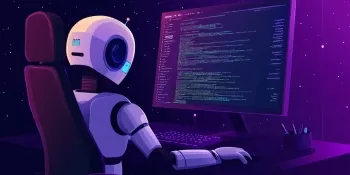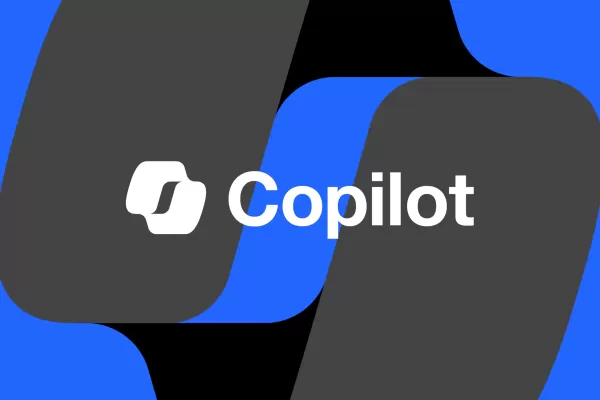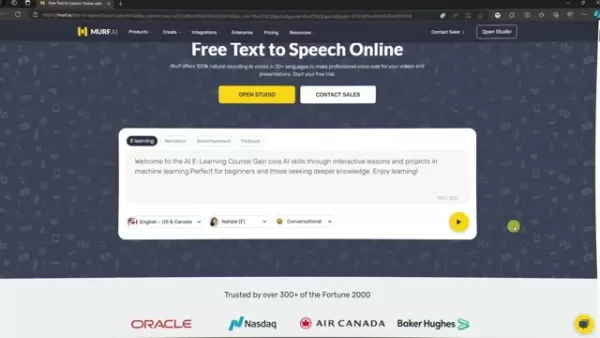AI Writes 20% of Salesforce's Code—Why Developers Aren't Concerned

When Anthropic's CEO predicted AI would author 90% of code within half a year, the developer community prepared for obsolescence. Yet at Salesforce, we're witnessing a different evolution unfolding.
"Agentforce has generated approximately 20% of all APEX code deployed in production over the past month," revealed Jayesh Govindarajan, Salesforce's SVP of AI, during our recent discussion. The metrics paint a compelling picture of rapid adoption: 35,000 monthly active users, 10 million lines of production-ready code accepted, and internal efficiencies reclaiming 30,000 developer hours monthly.
Rather than replacing engineers, AI is reshaping their role.
"While AI will likely produce most initial code drafts, developers are reinventing their contribution," Govindarajan observed. "The nature of engineering work is undergoing fundamental transformation."
From Syntax to Strategy: The Rise of Developer Orchestration
Software development traditionally balanced creative problem-solving with repetitive implementation. AI now handles the latter, freeing engineers for higher-value work.
"Engineers are transitioning from technical executors to strategic decision-makers," Govindarajan explained. "The focus shifts from 'how to build' to 'what to build' and 'why it matters to customers.'"
This mirrors historical technological shifts where tools expanded human capability rather than replacing it. Just as spreadsheets empowered analysts to focus on insights over calculations, AI coding tools amplify developer impact.
"Prototyping cycles that once spanned weeks now conclude in hours," Govindarajan noted. "Engineers can validate concepts with working software instead of specification documents, enabling faster feedback loops."
The Emergence of Intent-Driven Development
A new paradigm called "vibe coding" is gaining traction - a term popularized by OpenAI's Andrej Karpathy. This approach involves providing high-level direction to AI systems and refining their outputs.
"Developers supply strategic guidance while AI handles implementation details," Govindarajan described. "It's less about dictating every semicolon and more about curating the AI's creative output."
There's a new kind of coding I call "vibe coding", where you fully give in to the vibes, embrace exponentials, and forget that the code even exists. It's possible because the LLMs (e.g. Cursor Composer w Sonnet) are getting too good. Also I just talk to Composer with SuperWhisper…
The process resembles musical collaboration, where AI establishes foundational elements while developers perfect the composition.
"For complex infrastructure, human expertise remains essential," Govindarajan acknowledged. "But for business applications that combine existing systems? AI acceleration is game-changing."
Evolving Quality Assurance for AI-Generated Code
AI's probabilistic nature demands new testing methodologies. Salesforce developed the Agentforce Testing Center specifically to validate machine-generated code.
"Stochastic systems require different verification approaches," Govindarajan emphasized. "We need robust testing frameworks that can identify edge cases across hundreds of potential execution paths."
Accelerating End-to-End Development
The impact extends beyond initial coding to encompass the entire software lifecycle.
"AI enhances every phase - from intelligent code completion to automated test generation," Govindarajan explained. "This compression between ideation and implementation unlocks new creative possibilities."
Enduring Value of Computer Science Fundamentals
Despite these advancements, core engineering skills remain indispensable.
"Algorithmic thinking and problem decomposition are more valuable than ever," Govindarajan stressed. "The difference lies in applying these skills through AI collaboration rather than manual implementation."
Developers now need what Govindarajan calls "engineering taste" - the judgment to evaluate AI outputs and guide improvements.
The Strategic Developer Evolution
As implementation becomes assisted, developers are transitioning into business-technology liaisons.
"Engineers are becoming platform architects," Govindarajan said. "They orchestrate AI systems while maintaining ultimate accountability for what ships to production."
Salesforce's suite - including Agentforce for Developers, Agent Builder, and Testing Center - supports this expanded role across the development lifecycle.
This vision counters doomsday narratives, instead portraying AI as the most powerful developer tool ever created. For engineers who adapt, it represents professional elevation rather than replacement - transforming how value gets created while increasing their strategic importance.
Related article
 Windows 11 Update Introduces AI-Powered File Search in Copilot App
Microsoft is currently evaluating an enhanced Windows 11 feature that brings AI-powered file search capabilities directly into the Copilot application. This experimental functionality is being distributed to Windows Insiders using Copilot Plus PCs, i
Windows 11 Update Introduces AI-Powered File Search in Copilot App
Microsoft is currently evaluating an enhanced Windows 11 feature that brings AI-powered file search capabilities directly into the Copilot application. This experimental functionality is being distributed to Windows Insiders using Copilot Plus PCs, i
 AI-Powered Trip Planners Revolutionize Travel by Crafting Personalized Itineraries Instantly
Trip planning becomes effortless with cutting-edge AI solutions that streamline every aspect of travel organization. These intelligent assistants revolutionize travel preparation by crafting bespoke itineraries, identifying top attractions, and curat
AI-Powered Trip Planners Revolutionize Travel by Crafting Personalized Itineraries Instantly
Trip planning becomes effortless with cutting-edge AI solutions that streamline every aspect of travel organization. These intelligent assistants revolutionize travel preparation by crafting bespoke itineraries, identifying top attractions, and curat
 MURF AI Tutorial: How to Generate Ultra-Realistic Text-to-Speech Voices
Professional voiceover creation just got incredibly accessible! This in-depth guide explores MURF AI, an industry-leading solution delivering remarkably realistic AI voice generation. Discover how content professionals across marketing, education, an
Comments (0)
0/200
MURF AI Tutorial: How to Generate Ultra-Realistic Text-to-Speech Voices
Professional voiceover creation just got incredibly accessible! This in-depth guide explores MURF AI, an industry-leading solution delivering remarkably realistic AI voice generation. Discover how content professionals across marketing, education, an
Comments (0)
0/200

When Anthropic's CEO predicted AI would author 90% of code within half a year, the developer community prepared for obsolescence. Yet at Salesforce, we're witnessing a different evolution unfolding.
"Agentforce has generated approximately 20% of all APEX code deployed in production over the past month," revealed Jayesh Govindarajan, Salesforce's SVP of AI, during our recent discussion. The metrics paint a compelling picture of rapid adoption: 35,000 monthly active users, 10 million lines of production-ready code accepted, and internal efficiencies reclaiming 30,000 developer hours monthly.
Rather than replacing engineers, AI is reshaping their role.
"While AI will likely produce most initial code drafts, developers are reinventing their contribution," Govindarajan observed. "The nature of engineering work is undergoing fundamental transformation."
From Syntax to Strategy: The Rise of Developer Orchestration
Software development traditionally balanced creative problem-solving with repetitive implementation. AI now handles the latter, freeing engineers for higher-value work.
"Engineers are transitioning from technical executors to strategic decision-makers," Govindarajan explained. "The focus shifts from 'how to build' to 'what to build' and 'why it matters to customers.'"
This mirrors historical technological shifts where tools expanded human capability rather than replacing it. Just as spreadsheets empowered analysts to focus on insights over calculations, AI coding tools amplify developer impact.
"Prototyping cycles that once spanned weeks now conclude in hours," Govindarajan noted. "Engineers can validate concepts with working software instead of specification documents, enabling faster feedback loops."
The Emergence of Intent-Driven Development
A new paradigm called "vibe coding" is gaining traction - a term popularized by OpenAI's Andrej Karpathy. This approach involves providing high-level direction to AI systems and refining their outputs.
"Developers supply strategic guidance while AI handles implementation details," Govindarajan described. "It's less about dictating every semicolon and more about curating the AI's creative output."
There's a new kind of coding I call "vibe coding", where you fully give in to the vibes, embrace exponentials, and forget that the code even exists. It's possible because the LLMs (e.g. Cursor Composer w Sonnet) are getting too good. Also I just talk to Composer with SuperWhisper…
The process resembles musical collaboration, where AI establishes foundational elements while developers perfect the composition.
"For complex infrastructure, human expertise remains essential," Govindarajan acknowledged. "But for business applications that combine existing systems? AI acceleration is game-changing."
Evolving Quality Assurance for AI-Generated Code
AI's probabilistic nature demands new testing methodologies. Salesforce developed the Agentforce Testing Center specifically to validate machine-generated code.
"Stochastic systems require different verification approaches," Govindarajan emphasized. "We need robust testing frameworks that can identify edge cases across hundreds of potential execution paths."
Accelerating End-to-End Development
The impact extends beyond initial coding to encompass the entire software lifecycle.
"AI enhances every phase - from intelligent code completion to automated test generation," Govindarajan explained. "This compression between ideation and implementation unlocks new creative possibilities."
Enduring Value of Computer Science Fundamentals
Despite these advancements, core engineering skills remain indispensable.
"Algorithmic thinking and problem decomposition are more valuable than ever," Govindarajan stressed. "The difference lies in applying these skills through AI collaboration rather than manual implementation."
Developers now need what Govindarajan calls "engineering taste" - the judgment to evaluate AI outputs and guide improvements.
The Strategic Developer Evolution
As implementation becomes assisted, developers are transitioning into business-technology liaisons.
"Engineers are becoming platform architects," Govindarajan said. "They orchestrate AI systems while maintaining ultimate accountability for what ships to production."
Salesforce's suite - including Agentforce for Developers, Agent Builder, and Testing Center - supports this expanded role across the development lifecycle.
This vision counters doomsday narratives, instead portraying AI as the most powerful developer tool ever created. For engineers who adapt, it represents professional elevation rather than replacement - transforming how value gets created while increasing their strategic importance.
 Windows 11 Update Introduces AI-Powered File Search in Copilot App
Microsoft is currently evaluating an enhanced Windows 11 feature that brings AI-powered file search capabilities directly into the Copilot application. This experimental functionality is being distributed to Windows Insiders using Copilot Plus PCs, i
Windows 11 Update Introduces AI-Powered File Search in Copilot App
Microsoft is currently evaluating an enhanced Windows 11 feature that brings AI-powered file search capabilities directly into the Copilot application. This experimental functionality is being distributed to Windows Insiders using Copilot Plus PCs, i
 AI-Powered Trip Planners Revolutionize Travel by Crafting Personalized Itineraries Instantly
Trip planning becomes effortless with cutting-edge AI solutions that streamline every aspect of travel organization. These intelligent assistants revolutionize travel preparation by crafting bespoke itineraries, identifying top attractions, and curat
AI-Powered Trip Planners Revolutionize Travel by Crafting Personalized Itineraries Instantly
Trip planning becomes effortless with cutting-edge AI solutions that streamline every aspect of travel organization. These intelligent assistants revolutionize travel preparation by crafting bespoke itineraries, identifying top attractions, and curat
 MURF AI Tutorial: How to Generate Ultra-Realistic Text-to-Speech Voices
Professional voiceover creation just got incredibly accessible! This in-depth guide explores MURF AI, an industry-leading solution delivering remarkably realistic AI voice generation. Discover how content professionals across marketing, education, an
MURF AI Tutorial: How to Generate Ultra-Realistic Text-to-Speech Voices
Professional voiceover creation just got incredibly accessible! This in-depth guide explores MURF AI, an industry-leading solution delivering remarkably realistic AI voice generation. Discover how content professionals across marketing, education, an





























